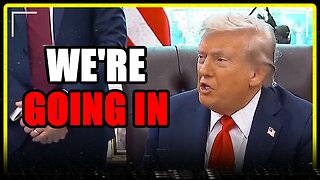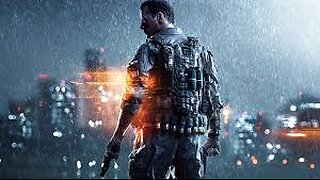Premium Only Content

U.S. forces carry out additional strikes against Iran-backed militia in Iraq.
Title: Unveiling the Escalation: U.S. Forces' Additional Strikes Against Iran-Backed Militia in Iraq
Introduction:
In recent geopolitical developments, the Middle East has once again found itself at the center of international attention as U.S. forces carry out additional strikes against Iran-backed militia in Iraq. This dissertation aims to dissect the implications, motivations, and potential consequences of these escalated military actions, shedding light on the complex web of relationships in the region.
Historical Context:
To understand the current events, one must first delve into the historical context of U.S.-Iran relations and the intricate dynamics within Iraq. The relationship between the United States and Iran has long been marked by tensions, fueled by ideological differences, geopolitical ambitions, and regional power struggles. The presence of Iran-backed militias in Iraq adds another layer of complexity, intertwining local conflicts with broader regional rivalries.
Motivations and Objectives:
The decision to carry out additional strikes signals a strategic move by U.S. forces, aiming to address perceived threats emanating from Iran-backed militias. The motivations behind these actions may range from safeguarding national security interests to deterring potential aggressors. Additionally, these strikes may serve as a response to prior incidents that threatened U.S. personnel or assets in the region.
Regional Ramifications:
The ripple effects of such military actions extend beyond the borders of Iraq. The delicate balance of power in the Middle East is at stake, with potential repercussions impacting regional stability and alliances. Neighboring nations and global actors are likely to closely monitor developments, as the situation has the potential to influence diplomatic relationships and alter the geopolitical landscape.
International Response:
The international community's response to these strikes is crucial in shaping the trajectory of events. Diplomatic efforts, sanctions, or condemnations may follow as nations navigate the delicate task of balancing alliances and geopolitical interests. The reactions of key stakeholders, such as European nations, Russia, and China, will play a pivotal role in determining the global response to the escalation.
Conclusion:
In conclusion, the U.S. forces' decision to carry out additional strikes against Iran-backed militia in Iraq marks a critical juncture in the complex geopolitics of the Middle East. The intertwined historical, regional, and international dimensions of this situation underscore the intricate challenges faced by policymakers. As the world watches and holds its breath, the consequences of these actions remain uncertain, leaving the potential for diplomatic solutions as the preferred path to avert further escalation and foster stability in the region.
-
 1:15:29
1:15:29
Flyover Conservatives
1 day agoFrom Cool to Cringe: How Democrats Lost America’s Ear | FOC Show
44K13 -
 8:19
8:19
MattMorseTV
11 hours ago $4.94 earnedTrump is ACTUALLY DOING IT.
43.2K38 -
 11:30:43
11:30:43
ZWOGs
14 hours ago🔴LIVE IN 1440p! - Tarkov w/ Casey & crgoodw1n, Kingdom Come Deliverance, & More - Come Hang Out!
36.9K5 -
 2:30:56
2:30:56
We Like Shooting
18 hours ago $2.71 earnedWe Like Shooting 625 (Gun Podcast)
35K1 -
 1:45:02
1:45:02
Glenn Greenwald
9 hours agoIsrael Slaughters More Journalists, Hiding War Crimes; Trump's Unconstitutional Flag Burning Ban; Glenn Takes Your Questions | SYSTEM UPDATE #504
138K182 -
 1:29:31
1:29:31
Killerperk
5 hours ago $0.78 earnedRoad to BF6. Come hang out #regiment #bf6
33.4K2 -
 4:35:45
4:35:45
Jokeuhl Gaming and Chat
6 hours agoDARKTIDE - Warhammer 40k w/ Nubes Bloobs and AoA
22.9K2 -
 7:14:12
7:14:12
Cripiechuccles
7 hours ago😁💚💙MOTA MONDAY WITH CRIPIE💚💙 👌SMOKING, GAMING & WATCHING FLICKS!:😁
18K3 -
 36:11
36:11
Stephen Gardner
6 hours ago🔥'Burn ALL TRUMP FLAGS’ says Tim Walz + Democrat CAUGHT rigging own election!
26.6K21 -
 10:10
10:10
robbijan
1 day agoHollywood’s Hidden Messages: Predictive Programming & What’s Next
19.2K20